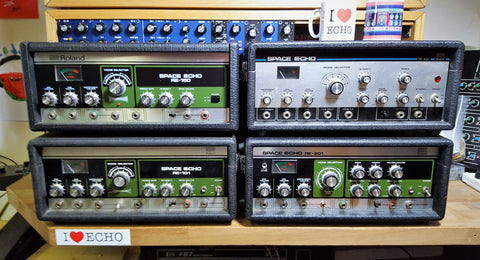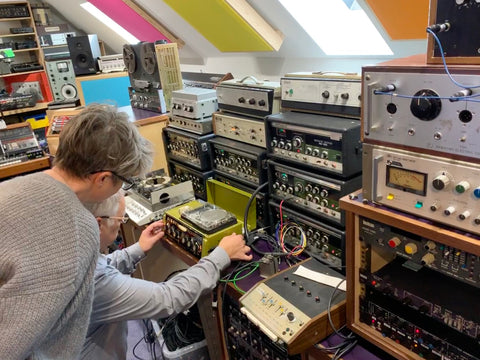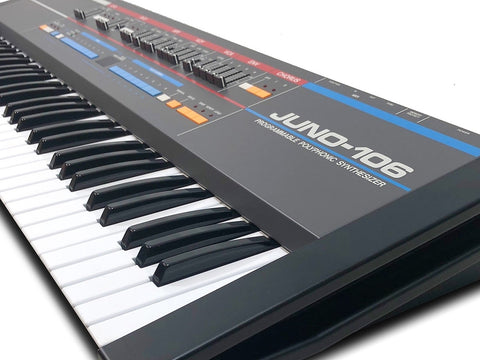An Introduction to Roland Tape Echoes
See our current tape echoes for sale >> HERE
We sell Space Echoes. We love Space Echoes. We sell quite a few Space Echoes, but that's OK because we love them quite a lot (so much so that we started wearing them and drinking out of them...). In fact, I'd be very surprised if there's anywhere else in the world selling more serviced Roland tape echoes than Soundgas (and not just serviced, but guaranteed - more on that later). Along the way, we've learned a few things, some of which I want to share here. This page is an introduction to these machines and how I came to fall for them so completely. Other pages that have been completed or are coming in this series are:
- Are Roland tape echoes reliable?
- Which tape should I use in my Roland tape echo?
- How to change a Roland tape echo loop.
- Which Roland (or Korg) tape echo model is best for me?
- Roland tape echo instruction sheets.
- Roland tape echo maintenance.
- Roland tape echo tricks and tips.
- Roland tape echo operator's manuals to download.
- Roland tape echo service manuals to download.

First love (by Tony)
I fell in love with the sound of tape echoes a long time ago, and over the years filled my studio with as many examples as I could lay my hands on. Initially, we had no budget for such luxuries and our first real tape echo was a very intermittent Melos - they use a small Apollon cartridge and (to be kind) sound 'characterful' - when they work. I recall working on a dub mix for my friend Tim 'Love' Lee's Peace Feast label - hear it below! - and using the digital delay in our Studio Quad when the Melos died (or just sounded too 'characterful') - running the wet signal hot into a cassette recorder to get the sound I was after. Later we joined the big league when I acquired my first Space Echo, an RE-201 which truthfully didn't sound great - it probably hadn't been serviced from new.
The Melos was eventually replaced (and the 201 superceded) by a very clean RE-501 that worked beautifully; this was later joined by a second immaculate RE-501. I ran both without incident for many years and although the sound of a 201 was undoubtedly what I was really after, the younger/cleaner 501s seemed a better bet for a studio without access to a good tape echo tech. Both my 501s are now long gone - the first when I bought Dave Formula's lovely 301 (which he used on several Magazine and Visage albums) and the second only after I'd fallen for the sound of Doctor Huw's amazing RE-201s here at Soundgas. I'll never part with my 301, nor the stunning Doctor Huw-modified RE-200 which sounds very different. If I didn't have daily access to a ceaseless supply of freshly-serviced RE-201s, then a Soundgas 201 would certainly be in my permanent studio collection.
Which leads us neatly onto:
Which model is the right model?
We get asked this question a lot - which is the best Roland tape echo? which is our favourite? which one do we recommend? As you can probably imagine this is BIG subject and we're going to need a separate article to delve into it properly. So for now the short answer is that (as is maybe becoming clear) we love the RE-201. But that's because it's the right machine for much of what we do both functionally and sonically. And it's also no doubt because we're not forced to actually choose a single machine, as we always have a fair selection of other models here to use as needed.
Each machine has its own spec, electronics and character, and you can't get one model to exactly emulate another - so there is no definitive, "ultimate" Roland echo that does everything. The right model(s) for you will depend on your set up, the kind of music you are making, and of course your ears.
Briefly, below are some - but definitely not all! - of the characteristics of the different machines. For a more detailed look at this head to our Roland vs Korg tape echo page.
RE-101 - a 201 without Reverb or EQ. Almost. It also has less options in terms of head patterns with each of the three heads only available singly.
RE-150 - again no Reverb or EQ. Similar head options to the 101, but different head spacing means the delays are not identical; but... on top of that most of the electronics inside are different from the 101/201 as well, so the end result is machine that does something different sonically. That "something" we like very much (magic with beats and when slightly overdriven generally) and we'll be devoting a whole page to these machines soon...
RE-201 - for us this is the king of the tape echo castle - a magical combination of the Roland preamps, Accutronics spring, all-discrete circuitry, the EQ, the musical heritage of these machines, the head spacings and combinations... we could go on. We're huge fans of dub production and its wider influence across music in general and these machines just give us the richness and warmth we are looking for. Every machine is different, but when you get a really good one the only word for us is "magic".

RE-301 - no more all-discrete circuitry from this point on in Roland's development, so straight away you would expect sonic differences from what has gone before. Different head spacings further move it away from RE-201 territory. Has the addition of a classic Roland chorus circuit, and also sound on sound - the whole package adds up to a superb machine that stands quite apart from its "dubbier" relative. Very versatile, and definitely recommended for guitarists who rarely let them go once they get a good one.

RE-501 / SRE-555 - these two are the same machine, with or without a heavy-duty rack case. Definitely designed by Roland to be their ultimate machine - for the time high tech and HiFi. They were going for a cleaner sound and ironed out many of the "flaws" in earlier machines. This precision and clarity can immediately suit some set-ups and musical styles. Chorus and sound on sound are all present but, along with head spacings, these are different to the 301. However, some of the flaws as perceived by the Roland engineers are the very things that make the earlier models so special, which is why when we service a 501 or 555 we set them up with the ability to self-oscillate (not a standard factory setting on these).
That's just scratching the surface, and we're also straying into "Tips and Tricks" territory which is a subject for another article. More to come on all of this soon...
Not all Space Echoes are equal.
A brief search online reveals that there are usually cheaper options if you want to buy a Roland tape echo than buying from Soundgas. Why are ours more expensive? Aside from the usual reasons - we are a real business, employing staff, paying rent/taxes etc, not just some guy in a shed (though that's how Tony started out - so no offence to anyone quietly fuming in their shed). We put a lot into our echoes - heart and soul - plus a wealth of experience and knowledge gained over decades of working with these machines both in the workshop and the studio. When we say 'serviced' we mean thoroughly-overhauled, not just a squirt of switch cleaner and a new tape.
You can read more about our servicing on the Are Roland Tape Echoes Reliable? page... But borrowed from there (because it's so cool) here is a time-lapse of Doctor Huw servicing a Space Echo:
Our guarantee
Our machines are not only generally in excellent cosmetic and physical shape (if we say 'mint', we mean factory fresh), but they come backed by our six month guarantee against mechanical failure (for non-smoking home/private studio use). Any problems within that six month period, we'll take care of it. And after that as a Soundgas customer, you have access to our techs for any future servicing requirements. Conditions apply. Read more about how we guarantee all our gear here, and get in touch if you have any questions.
We are human, and vintage gear is full of surprises: things can and do go wrong no matter how much care we lavish on these machines. So, beyond our exceptional levels of reliability of the machines, it's how we deal with problems that I hope sets us apart - we aim to have your machine repaired and back to you with the minimum of fuss and inconvenience to you. This means you can get on with making music, rather than figuring out how to fix your tape echo.
Tape: The Never-ending Quest...
Which tape you should use is another big subject and one which we deal with on our which tape we recommend for Roland echoes page. However if you want the short version, we only used and recommend Echo Fix loops - buy them from our site here, or direct from Echo Fix in Australia.
More to come on this page, but meanwhile if you want to dig deeper into what these machines can do we'd recommend having a look at our Roland Echo Tips, Tricks and Tales.
==============
Thanks for reading. This post is one of a series on the Roland tape echoes that we will be compiling into an online resource for tape delay fans and users. Other instalments will include talking about reliability of tape echoes, how to choose the right tape delay, care and maintenance, and some secret tips and tricks.






